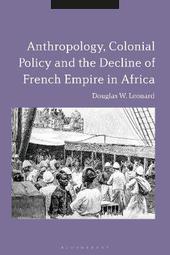
|
Anthropology, Colonial Policy and the Decline of French Empire in Africa
Hardback
Main Details
| Title |
Anthropology, Colonial Policy and the Decline of French Empire in Africa
|
| Authors and Contributors |
By (author) Douglas W. Leonard
|
| Physical Properties |
| Format:Hardback | | Pages:248 | | Dimensions(mm): Height 234,Width 156 |
|
| Category/Genre | Colonialism and imperialism
National liberation, independence and post-colonialism |
|---|
| ISBN/Barcode |
9781788315203
|
| Classifications | Dewey:325.344096 |
|---|
| Audience | | Tertiary Education (US: College) | |
|---|
| Illustrations |
2 Maps
|
|
Publishing Details |
| Publisher |
Bloomsbury Publishing PLC
|
| Imprint |
Bloomsbury Academic
|
| NZ Release Date |
26 December 2019 |
| Publication Country |
United Kingdom
|
Description
Conceived as both a vehicle to national prestige and as a civilizing mission, the second French colonial empire (1830-1962) challenged soldiers, scholars, and administrators to understand societies radically different from their own. The resultant networks of anthropological inquiry, however, did not have this effect. Rather, they opened pathways to political and intellectual independence framed in the language of social science, and in the process upended the colonial political system and reshaped the nature of human inquiry in France. While still unequal, French colonial rule in Africa revealed the durability and strength of non-European modes of thought. In this influential new study, historian Douglas W. Leonard examines the political and intellectual repercussions of French efforts to understand and to dominate colonial Africa through the use of anthropology. From General Louis Faidherbe in the 1840s to politician Jacques Soustelle and sociologist Pierre Bourdieu in the 1950s, these French thinkers sowed the seeds of colonial destruction.
Author Biography
Douglas W. Leonard is an Assistant Professor of History at the United States Air Force Academy, USA
ReviewsAn intricate analysis of the intellectual connections and professional networks linking successive generations of leading French empire administrators. This work explains, not only the derivations of colonial knowledge, but the flawed presumptions on which it rested. A powerful reminder of the dangers intrinsic to conceptions of civilizational hierarchy, Leonard's work pulls apart the threads of France's cultural imperialism. * Martin Thomas, Professor of History, University of Exeter, UK * This is an important book, offering a new approach to the production of knowledge about African societies under French colonialism. Leonard demonstrates the ways in which French ethnographers and colonial administrators relied upon unacknowledged African interlocutors whose views deeply influenced their work. A major reference point for the scholarship on Francophone Africa. * Bruce S. Hall, Associate Professor of History, UC Berkeley, USA *
|